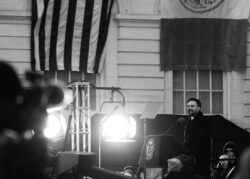Several weeks before the end of the summer, I rented out several seasons of one of my favorite television shows, The West Wing, from the local library with the intent of exposing my family to quality television. I checked the episodes before showing them to my parents, screening out anything related to sex or anything too liberal for my conservative parents to handle. After several successful episodes, I relaxed somewhat. One particular episode has a moving scene where President Bartlet yells at God in Latin in a cathedral after a death—the message being that his Catholic faith is so strong that he’s fluent in Latin—and in any case, he and God make up by the end of the episode.
After the end credits, my mom told me she was going to call it an evening with a troubled look on her face. I asked her what was wrong.
“I think I’m going to hold off on watching any more episodes until I talk to the priest,” she told me.
A priest? Why did she need to talk with a priest? Her answer: she needed to make sure that she hadn’t just been exposed to a blasphemy.
Growing up I believed that there were no parents more conservative about television than my own. I resented the fact that no one else’s parents seemed to frown upon their watching shows like Friends. I can count on one hand the episodes of The Simpsons I saw before college: my parents believe it’s unwholesome.
Then I learned about the Parents Television Council, and found out that my parents are by no means the worst. This self-appointed watchdog group has been mobilizing parents that freak out easily since their founding in 1995, and came to prominence in the aftermath of Janet Jackson’s nipple terrorizing the nation during the 2004 Superbowl. The Federal Communications Commission has reported that the number of indecency complaints has jumped from 350 in 2000 and 2001 to 14,000 in 2002 and nearly a quarter million a year later. Entertainment Weekly reported that approximately 99 percent of the indecency complaints come from either the PTC website or through members of the PTC themselves filling out tens of thousands of complaints a year. This won’t surprise you if you visit their website. All you need to do is type in the name of the show, where you saw it, what bothered you about it and your contact info, and you’re done in two minutes.
The PTC’s slogan is “Because our children are watching,” and in many ways it’s hard to fault them for trying to protect their children from sex on television. Having watched in college many of the shows I couldn’t watch at home, I’ve decided that I wouldn’t let my child watch most of those shows. Most of PTC’s criticism of shows centers on the fact that children shouldn’t be exposed to sex, but we all shouldn’t be protected as if we are children.
Of course, such righteous anger can easily turn into overreaction on minor issues; even my parents admit they sometimes go overboard in their indignation. Similarly, the PTC has developed a habit of exaggerating or outright lying in their quest to childproof the airwaves. A 2005 report about profanity on television singled out SpongeBob SquarePants as encouraging children to use foul language based on a misinterpretation of a single episode, when just a few years earlier they had named the show one of the best on television.
Furthermore, the PTC has attacked alleged indecency without looking into its broader context.
“Ironically, [a Without a Trace episode critized by the PTC] had a fair amount of redeeming social value. Yes, it was the ‘teen orgy’ episode, but the whole message of the show was for parents, saying, ‘’Do you know what your kids are doing after school?’” an anonymous television executive told Entertainment Weekly.
While major incidents such as Nipplegate provoke mass outrage—the PTC’s 65,000 complaints were only a fraction of the half-million received by the FCC—in most indecency cases, the outrage is limited solely to the PTC and no one else, giving them disproportionate influence. There is no evidence that a majority of the country supports the PTC’s crusades. Only 18 percent of Americans supported the FCC’s decision to investigate CBS in the aftermath of Nipplegate, yet they went ahead anyway.
Protecting children from undue influences is a good motive, but they should focus on campaigns such as television ratings that moves the responsibility of policing children where it belongs: with the parents.




